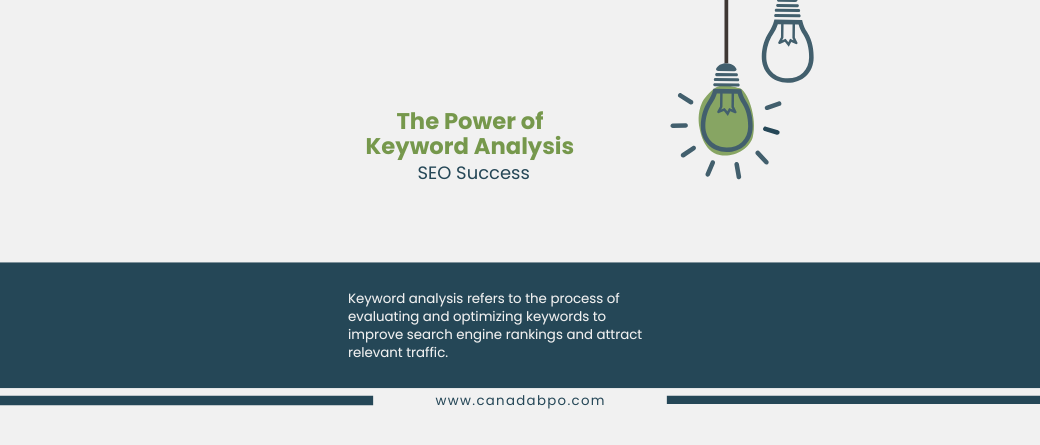In the competitive landscape of digital marketing, understanding your audience’s search behavior is crucial for driving traffic and achieving your online goals. Keyword analysis is a fundamental process that enables businesses to identify and leverage the most effective keywords for their SEO and content strategies. This blog post will explore the importance of keyword analysis, its key components, and how to conduct it effectively to enhance your online presence.
What is Keyword Analysis?
Keyword analysis refers to the process of evaluating and optimizing keywords to improve search engine rankings and attract relevant traffic. This involves identifying high-value keywords, understanding their performance metrics, and strategically incorporating them into your content to align with user intent and search engine algorithms.
Why Keyword Analysis is Essential
- Enhanced Visibility and Traffic: Proper keyword analysis helps you discover the terms and phrases your target audience is using to search for products or services similar to yours. By targeting these keywords, you can improve your website’s visibility in search engine results pages (SERPs) and drive more organic traffic.
- Improved Content Strategy: Understanding which keywords are most relevant to your audience allows you to create content that addresses their needs and interests. This ensures that your content is valuable and engaging, leading to higher user satisfaction and better engagement.
- Competitive Advantage: Keyword analysis provides insights into the keywords your competitors are targeting. By identifying gaps and opportunities in your niche, you can develop strategies to outpace your competition and capture a larger share of the market.
- Effective Ad Campaigns: For pay-per-click (PPC) advertising and other paid search campaigns, keyword analysis helps you select the most effective keywords to target, optimize your ad spend, and maximize your return on investment (ROI).
Key Components of Keyword Analysis
- Keyword Research
Keyword research is the initial step in keyword analysis, involving the identification of potential keywords based on relevance, search volume, and competition. This process includes:- Brainstorming Seed Keywords: Start with broad terms related to your business, products, or services. Use these seed keywords as a foundation for further research.
- Using Keyword Tools: Utilize tools like Google Keyword Planner, Ahrefs, SEMrush, and Moz to generate keyword ideas and gather data on search volume, competition, and keyword difficulty.
- Keyword Evaluation
After gathering a list of potential keywords, evaluate them based on the following criteria:- Search Volume: The number of searches for a specific keyword. Higher search volume indicates greater interest and potential traffic, but it also often comes with higher competition.
- Keyword Difficulty: A measure of how challenging it is to rank for a keyword. Higher difficulty means more competition and may require more effort to achieve top rankings.
- Relevance: Ensure that the keywords align with your business goals, target audience, and the content you plan to create. Keywords should be relevant to your products or services and address user intent.
- Competitive Analysis
Analyze the keywords your competitors are targeting to gain insights into their strategies and identify opportunities for differentiation. This involves:- Identifying Competitors: Determine who your main competitors are in your industry or niche.
- Analyzing Competitor Keywords: Use tools to examine the keywords your competitors are ranking for and their PPC campaigns. Look for gaps and opportunities that you can capitalize on.
- Keyword Segmentation
Organize your keywords into categories or groups based on topics, themes, or user intent. This helps you create a structured content plan and ensures that each piece of content targets specific keywords effectively. Segmentation includes:- Primary Keywords: Main keywords that are highly relevant to your business and have significant search volume.
- Secondary Keywords: Related keywords that support primary keywords and provide additional context.
- Long-Tail Keywords: Longer, more specific phrases with lower search volume but higher intent. These can help you target niche audiences and address specific queries.
- Performance Monitoring
Regularly monitor the performance of your targeted keywords to assess their effectiveness and make data-driven adjustments. Key performance metrics include:- Ranking Position: Track your website’s ranking for targeted keywords and identify areas for improvement.
- Organic Traffic: Measure the amount of traffic driven by specific keywords and evaluate its impact on overall website performance.
- Conversion Rates: Analyze how well your keywords are converting visitors into leads or customers. This helps you understand the effectiveness of your keyword strategy in achieving your business goals.
How to Conduct Effective Keyword Analysis
- Utilize Advanced Tools
Leverage advanced keyword analysis tools to gather in-depth data and insights. Popular tools include:- Google Keyword Planner: Provides search volume estimates, keyword suggestions, and competition levels.
- Ahrefs: Offers comprehensive keyword analysis, including keyword difficulty, search volume, and related keyword ideas.
- SEMrush: Provides keyword research features along with competitive analysis and performance tracking.
- Moz: Offers keyword research and tracking tools with detailed performance metrics.
- Focus on User Intent
Consider the intent behind the keywords you are targeting. Are users looking for information, making a purchase, or seeking solutions to a problem? Align your content with user intent to ensure it meets their needs and provides value. - Optimize Content and On-Page Elements
Incorporate your targeted keywords into key on-page elements such as page titles, meta descriptions, headers, and body content. Ensure that your keywords are used naturally and contextually to avoid keyword stuffing. - Adapt to Trends and Changes
Stay updated with changes in search trends and user behavior. Regularly revisit your keyword analysis to adapt to evolving trends, new search patterns, and emerging opportunities. - Evaluate and Adjust
Continuously evaluate the performance of your keywords and make adjustments as needed. Refine your keyword strategy based on performance data, user feedback, and changes in the competitive landscape.
Keyword analysis is a crucial component of a successful SEO strategy. By understanding which keywords are most valuable for your business and optimizing your content accordingly, you can enhance your search visibility, attract targeted traffic, and achieve your marketing objectives. At Canada BPO Services, we specialize in keyword analysis and SEO strategies tailored to your business needs. Contact us today to learn how we can help you unlock the full potential of your keyword strategy and drive results for your online presence!










